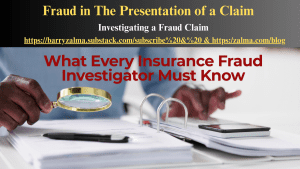Fraud in The Presentation of a Claim

Post 4959
See the full video at https://rumble.com/v64ap97-fraud-in-the-presentation-of-a-claim.html and at https://youtu.be/qV2_b5DOhEc
To properly investigate a fraudulent insurance claim it is necessary that the investigator and the insurer for whom he works, understands the law relating to insurance fraud and the rights the insurer, and its investigators have, to obtain the necessary evidence to prove a fraud has been attempted.
INSURANCE FRAUD
Insurance fraud in the presentation of a claim, by definition, voids insurance. In 1884 the U.S. Supreme Court considered the issue and decided that a fraud in the presentation of a claim, even if it was not intended to deceive the insurer and would have had little effect on the indemnity paid, still caused the policy to be void and the claim to be denied.
In Claflin & Others v. Commonwealth Insurance Company.; Same v. Western Assurance Company.; Same v. Franklin Insurance Company, 110 U.S. 81; 3 S. Ct. 507; 28 L. Ed. 76; 1884 U.S. LEXIS 1661 the U.S. Supreme Court found that after a loss, a person named Murphy assigned his claims against the several companies under the policies to the plaintiffs.
Claflin holds that the materiality of a statement is not defined and determined by the effect it has on the outcome of the investigation. Rather, a question and answer are material when they relate to the insured’s duty to give to the insurer all the information he has as well as other sources of information so that the insurer can make a determination of its obligations.
Defendant insurers had issued insurance policies on certain goods. Plaintiffs were assigned the goods and brought suits under the policies against defendants as assignees of the original insured. After determining that the lower court had jurisdiction over the matter, the court affirmed judgment for defendants because the record showed the assignor had made false statements and therefore plaintiff assignees could not prevail.
In any view, there was a fraud attempted upon the insurers; and it is not lessened because the motive that induced it was something in addition to the possible injury to them that it might work. The supposition proceeds upon the very ground of the false statement of a material matter, knowingly and wilfully made, with the intent to deceive the defendants in error; and it is no palliation of the fraud that Murphy did not mean thereby to prejudice them, but merely to promote his own personal interest in a matter not involved in the contract with them. By that contract the companies were entitled to know from him all the circumstances of his purchase of the property insured, including the amount of the price paid and in what manner payment was made; and false statements, wilfully made under oath, intended to conceal the truth on these points, constituted an attempted fraud by false swearing which was a breach of the conditions of the policy, and constituted a bar to the recovery of the insurance.
INTENTIONAL MISREPRESENTATION
Almost every insurance policy issued in the United States has a clause equal to or similar to that in the New York Standard Fire Insurance policy, that like the standard fire policy in most states, provides, that provides in relevant part, as follows: “This entire policy shall be void if, whether before or after a loss, the insured has willfully concealed or misrepresented any material fact or circumstance concerning this insurance or the subject thereof, or the interest of the insured therein, or in case of any fraud or false swearing by the insured relating thereto.”
The fraud investigator must understand that an insured who lies about material facts is grounds to refuse coverage for fraud. For example, when an insured lied intentionally about a claim to prevent her criminally violent son from harming her physically sued the insurer who denied the claim when it learned she had lied to them. She failed to recover any benefits because the concealment or fraud provision of her policy effectively barred her claim.
Anyone who is charged with investigating insurance fraud must gather admissible evidence that shows an intentional misrepresentation or concealment of material facts. With that evidence the right to the benefits of an insurance policy are forfeited.
 (c) 2024 Barry Zalma & ClaimSchool, Inc.
(c) 2024 Barry Zalma & ClaimSchool, Inc.
Please tell your friends and colleagues about this blog and the videos and let them subscribe to the blog and the videos.
Subscribe to my substack at https://barryzalma.substack.com/subscribe
Go to X @bzalma; Go to Newsbreak.com https://www.newsbreak.com/@c/1653419?s=01; Go to Barry Zalma videos at Rumble.com at https://rumble.com/account/content?type=all; Go to Barry Zalma on YouTube- https://www.youtube.com/channel/UCysiZklEtxZsSF9DfC0Expg
Go to the Insurance Claims Library – https://lnkd.in/gwEYk
Like this:
Loading…
Related
About Barry Zalma
An insurance coverage and claims handling author, consultant and expert witness with more than 48 years of practical and court room experience.



